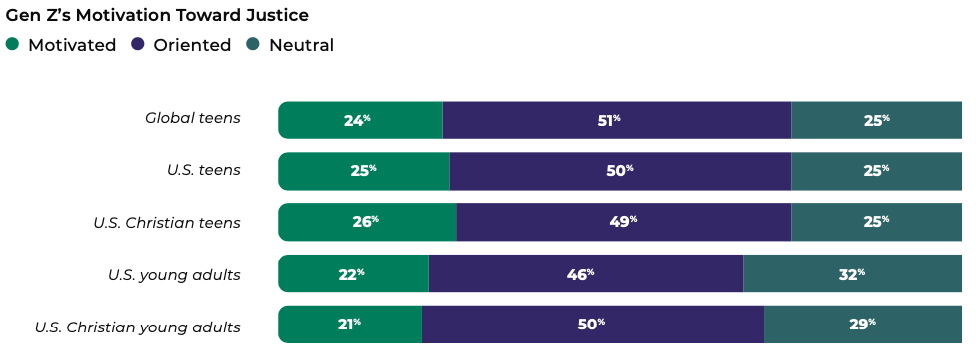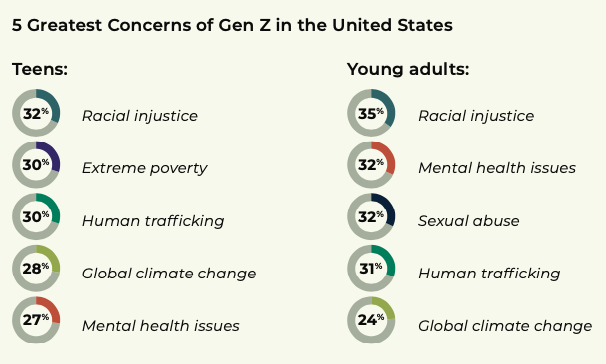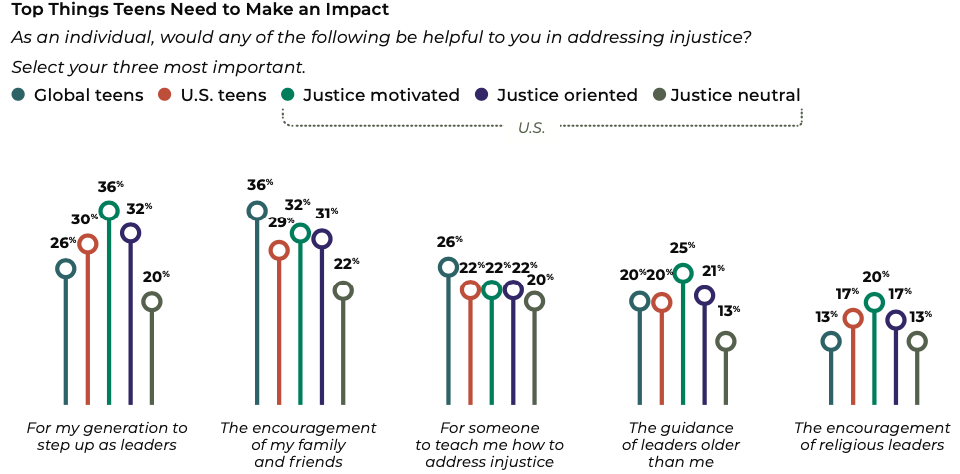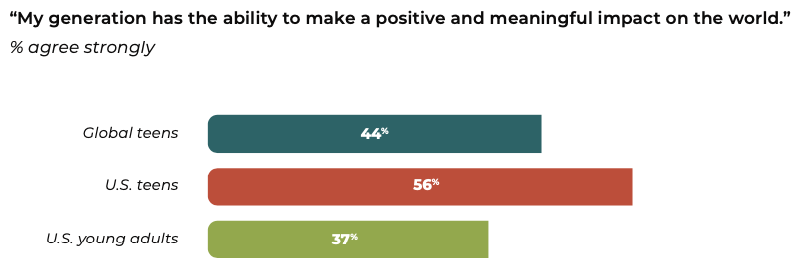A quarter of the world’s teenagers say the church has “definitely” lost its effectiveness as a force against injustice, poverty and environmental challenges, new research shows.
But in the United States, Generation Z is more optimistic about organized religion’s role in improving society, according to a study produced by Barna in partnership with Alpha, Biblica and World Vision.
The study found 37% of young people say the church “is definitely making an impact on these issues,” the researchers explained. “Among Christians, and even among teens of other faiths, this number rises to over two in five.”

Consequently, American teenagers told researchers they prefer to affiliate with congregations that support social justice causes and mental health — just as they do.
“Teens are involved in addressing pressing challenges that have personal relevance,” said Michael Chen, head of school at Pacific Bay Christian School in Pacifica, Calif. His comments are highlighted in the report.
“The young people I work with seem to crave a sense of belonging,” he added. “This is not merely the need to belong to a group of friends; it is also (feeling) they are participating in the active involvement of the gospel work. (Young people) want to see how the gospel actually makes the world a more just, loving and meaningful place, and in turn, they can be part of that significant impact.”
Barna and its partners conducted interviews with more than 25,000 teens in 26 countries during 2021 and 2022. Respondents ages 13 to 17 — the youngest of Gen Z — answered questions about global concerns, mental health issues and the role of faith and community in their lives.

“Along the way, we have ended up observing some remarkable differences between teenagers today and the young adults we heard from just a few years ago. Chief among these differences is teens’ openness,” the study’s authors noted.
That inspired the study’s title, “The Open Generation.”
“From a global vantage point, there is a lightness of being among today’s teens that is less common among young adults even just a few years ahead of them,” the researchers explained. “This research offers an emotional portrait of a connected, digitally enabled generation — especially as it relates to the sacred text, central character and expression of the Christian faith.”
Researchers said they also found an urgency in the data, especially as it relates to American teenagers. “Teens are in a precarious and profound season. After all, young adults even a couple years older exhibit more signs of emotional strain, spiritual uncertainty and social isolation.”
Barna said 56% of U.S. teens and young adults identify as Christian, with more than half of them (57%) being Catholic. “Christian teens in the U.S. are evenly split between being committed and nominal Christians, while young adults are far less likely to be committed.”
Barna found 19% of Gen Z Americans, and twice as many young adults, are agnostic, atheist or report no religious identity at all. “More than any other U.S. generation before them, Gen Z does not assert a religious identity. But it remains to be seen whether this represents a clean break from faith.”
But the generation nevertheless is defined by an intense commitment to service across social, racial and environmental concerns influenced by where they live.

“Globally, extreme poverty (38%), global climate change (35%), unemployment (33%), sexual abuse (33%), political corruption (31%) and pollution (31%) are front of mind for the majority of teens,” the report states. “In the U.S. — and in much of the West — that list looks different, as teens feel that racial injustice is of greatest concern (32%), followed closely by global extreme poverty (30%) and human trafficking (30%).”
Gen Z in the U.S. also is notable for an increasing determination to take action on issues of justice.
“U.S. teens trend higher than their global peers in their reported motivation to address injustices in society,” the report says. “U.S. teens who are Christian rise 10 points above Christian teens worldwide in being very motivated to address injustice (47% vs. 37%). Further, U.S. teens of other faiths (62%) are exceptionally likely to report this motivation.”
Respondents also were asked to identify what would most help them as individuals in social justice ministry. The leading answer among U.S. teens (30%) was for their generation to take a stand on the issues, compared to 20% of global teens who answered the same. Only 17% of American teens said guidance from a religious leader would help, versus 13% of teens internationally.
Barna also found that as motivation for justice work among American teens increases, so does their faith in religious institutions to make a difference for the good.
“Justice-oriented teens stand out in hoping the church will teach people about the sources of injustice and welcome people into the church,” the report explains. “U.S teens of other faiths or no faith hope churches and Christian leaders will be engaged in advocacy.”
Many Christian teens said they also are looking for communities that help them with their personal struggles: “In matters of what the church can be addressing, U.S. teens, especially those who are justice motivated and justice oriented, prefer to attend a church that promotes positive mental health.”

The survey found a divide between American and global teenagers on the quality of mental health and personal security they enjoy, with U.S. teens more likely “to say they experience uncertainty and pressure to be successful or perfect. At the same time, they are more likely to feel optimistic and confident. Their emotional profile is generally more vibrant than the global average.”
Significant differences by gender also were captured in the data. “Young men in the U.S. are more likely than young women to feel optimism, satisfaction with their choices, security in who they are and an ability to accomplish their goals,” the authors explain. “Meanwhile, Gen Z women in the U.S. report more anxiety about important decisions, fear of failure and uncertainty about the future.”


